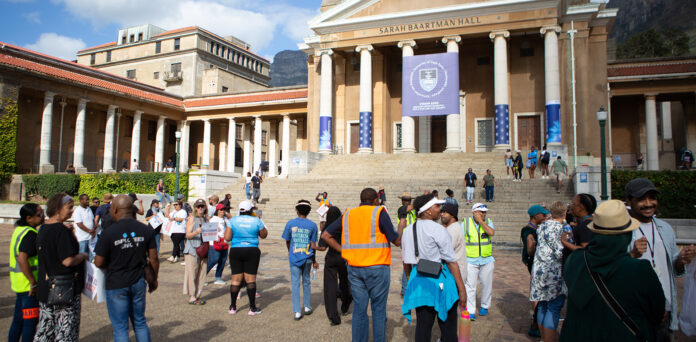A confidential investigative report submitted to the director-general of the Department of Higher Education and Training has called for urgent action at the University of Cape Town (UCT) following serious allegations of a drug abuse cover-up, among other things, against associate
professor Leon Holtzhausen.
The report, dated September 1, 2023, and submitted to the director-general of the department, scrutinises claims of substance abuse, suspected arson and unethical conduct.
It also raises concerns about the university’s treatment of whistleblowers, particularly since Holtzhausen was subsequently promoted.
According to the report, the allegations first surfaced in 2018. Prof Ndangwa Noyoo, identified as a whistleblower in the document, reported the matter to the department, and it acknowledged his protection under the Protected Disclosures Act.
The report states that in 2018, “a fire occurred in an office allegedly used by Prof Holtzhausen for drug-related activities”.
Surveillance footage, it adds, showed Holtzhausen at the scene “holding a box suspected to contain drug paraphernalia, which later disappeared”.
Despite these events, an investigation commission by UCT found no conclusive evidence linking Holtzhausen to either arson or drug abuse, and subsequently dismissed the allegations.
The departmental report has since poked holes into it, criticising its process and suggesting it may have fatally suffered from bias and a lack of thoroughness.
The document further asserts that Noyoo and other whistleblowers “faced harassment, demotion, and non-renewal of contracts”. It also highlights that “Prof Holtzhausen was later promoted to head of department despite the allegations”.
A list of recommendations are directed to UCT’s vice-chancellor to conduct investigations into the university’s handling of the original allegations and the circumstances under which Holtzhausen was promoted.
Department also wants thorough inquiry into possible reprisals against the whisteblowers. It also wants the varsity to identify an external experts to help the university deal with substance abuse.
“That the promotion of Prof Holtzhausen be scrutinised.
“In the face of the overwhelming evidence to support all the allegations levelled against Associate Prof Leon Holtzhausen… it is recommended that the department advise the vice-chancellor of the University of Cape Town to reopen the investigation into all allegations of the use of drugs or the abuse of substances on campus levelled against him.
“It is recommended that the department advise the vice-chancellor of the University of Cape Town to commission an inquiry into the allegations of ‘occupational detriment’ at the university, particularly the non-renewal of the contracts of some of the staff and the termination of employment or resignations of those who have previously raised concerns about Associate Professor Leon Holtzhausen’s alleged use or abuse of drugs on campus,” reads the report.
The department also recommended that the department advise the vice-chancellor to institute an inquiry to look into the manner in which, after being accused of such serious unethical conduct or behaviour, Holtzhausen ended up being promoted to head of social development.
“It is recommended that the department advise the vice-chancellor of the University of Cape Town to consider working with an independent organisation that deals with substance abuse or drug addictions to look into the allegations levelled against Associate Professor Leon Holtzhausen and to convince him to cooperate with such an organisation as a way of clearing his name.”
The department’s report is highly critical of UCT management and institutional culture.
“The university’s lip service and lack of commitment to the holistic, non-discriminatory, and fair implementation of its own [policies] has created a culture in which some of the good citizens of UCT… are not only subjected to occupational detriment but also demented and purged out of the institution,” it states.
It also warns of the potential consequences of the university’s approach. “The insouciant attitude of the senior staff at the University of Cape Town towards the allegations levelled against Associate Professor Leon Holtzhausen and the manner in which they handled the investigation instituted by the university against him and ended up rewarding him with a promotion is not doing the institution and him a favour and could backfire against him or the university at a later stage.”
The report concludes by urging UCT’s vice-chancellor to take decisive action, with a focus on transparency, accountability, and restoring the institution’s integrity.
UCT spokesperson Elijah Moholola stated that two investigations were carried out into the October 2018 incident: an internal probe by Campus Protection Services (CPS) in 2018, and an independent external investigation in 2022. “Both reports found no conclusive evidence and recommended no action against the academic.”
The CPS report indicated the officer was “unable to find the exact cause of the fire and who was responsible.” In response to DHET’s July 2023 inquiry, UCT shared all relevant information. Moholola added, “The appointment of any HoD is based on a fair and transparent process.” Holtzhausen declined to comment.



